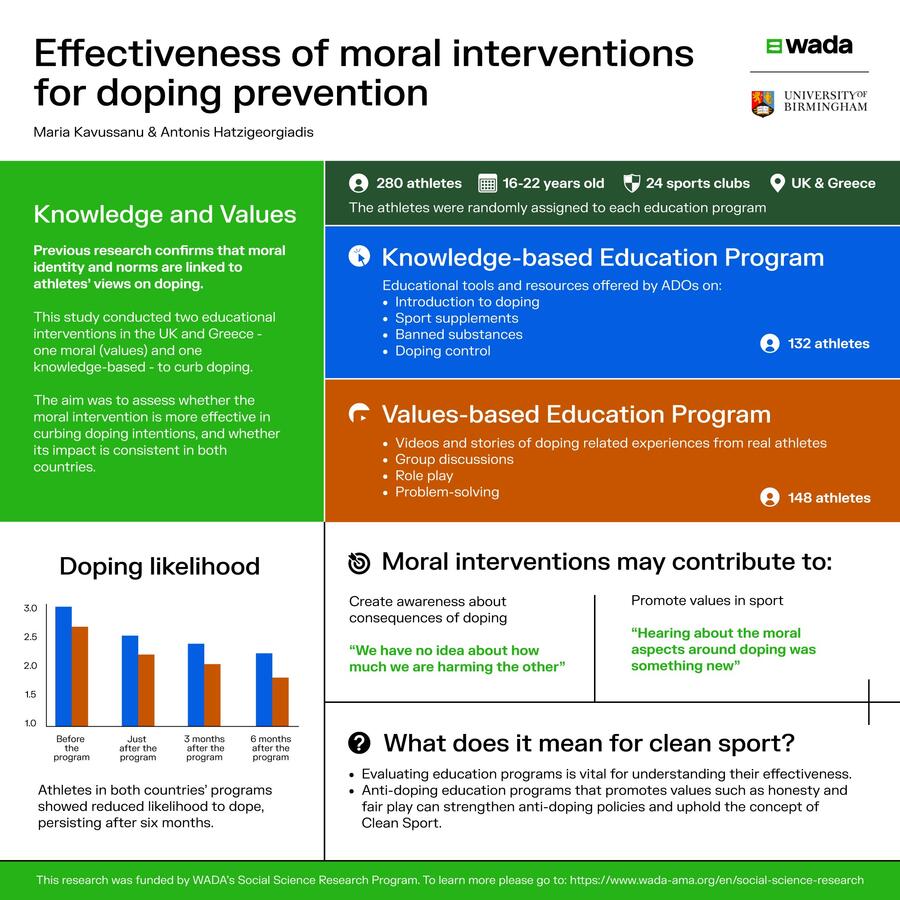En vigueur Date de publication 14 MAI 21
From research to application: An evidence-based psychosocial intervention for doping prevention in young athletes
Description du projet
Ce document n'est actuellement disponible qu'en anglais.
Elite athletes can be persuaded not to take banned substances – either by appealing to their sense of morality or educating them about the risks of using performance-enhancing drugs, according to previous research.
The aim of this research project was to develop, implement, and evaluate an evidence-based moral intervention, and determine whether it is more effective than a standard educational (i.e., knowledge-based) intervention, in reducing doping likelihood in young athletes, in the UK and Greece.
Researchers developed two separate intervention programmes – one targeting moral factors associated with doping likelihood, the other introducing doping and providing information about the health consequences of banned substances and the risks of sport supplements.
Methodology
Phase 1 - Intervention Development and Screening Survey:
In this phase, the researchers developed a moral intervention consisting of six one-hour sessions aimed at changing predictors of doping intentions: moral identity, moral disengagement, and moral atmosphere. A screening survey was conducted involving over 1000 athletes across Greece and the UK to identify eligible participants with some likelihood of doping. The interventions were pilot-tested with athlete feedback guiding revisions.
Phase 2 - Intervention Delivery and Evaluation:
A total of 280 athletes from 24 clubs in Greece and the UK were selected for the study. Clubs were randomly assigned to receive either the moral or educational intervention. Participants were aged 16-22, participating in individual and team sports. The interventions were delivered over six-to-eight weeks, with measures collected at four time points. Data analysis employed a repeated measures multivariate approach, assessing outcomes for intervention type, gender, and time.
Phase 3 - Focus Groups:
After the interventions, focus groups were conducted with participants (32 in Greece, 35 in the UK) to gather qualitative insights.
Main finding
Both programs were tested on young elite athletes from the UK and Greece, finding that both approaches were effective at deterring the athletes from taking banned substances over a six-month period.
Impact for Clean Sport
- Program Evaluation: The project highlights the importance of evaluating the effectiveness and outcomes of antidoping education programs. Understanding the impact of interventions is crucial for refining strategies and ensuring that efforts are yielding the desired results.
- Promoting Values-Based Education: The findings advocate for the promotion of values-based education programs for doping prevention. By emphasizing values such as honesty, fair play, and ethical behavior, these programs can effectively reduce athletes' likelihood of engaging in doping.
- Fostering Clean Sport Ideals: Values-based education can contribute to fostering clean sport ideals. By emphasizing the significance of ethical behavior and integrity, athletes are more likely to align with the principles of fair competition and uphold the spirit of clean sport.
- Long-Term Effectiveness: The research demonstrated that the moral intervention had lasting effects on athletes' attitudes towards doping even six months after completion. This highlights the potential for creating interventions that have a sustained impact over time.
- Policy and Advocacy: The study underscores the importance of advocating for values-based anti-doping education programs at policy levels. Such programs can contribute to a cultural shift within the sports community towards integrity, ethics, and honesty.
Overall, this research project contributes to the advancement of antidoping efforts by providing evidence-based insights into effective education strategies. By targeting athletes' moral identity and values, the project aligns with the overarching goal of maintaining a level playing field, upholding fair competition, and promoting clean sport principles.
Related Publications:
